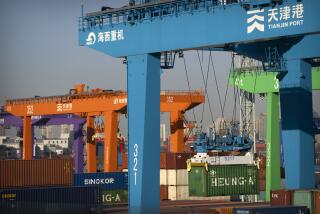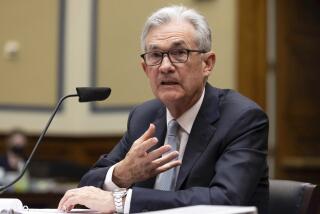Recession Not Part of OECD’s 1988 Forecast : Slow Growth Will Likely Be Pattern for 1988, Report Concludes With ‘Conditional Optimism’
- Share via
PARIS — In a report characterized by its principal author as “highly conditional optimism,” the Organization for Economic Cooperation and Development forecast Tuesday that the world will inch forward with low economic growth, but no recession, in the coming year.
In the wake of the October stock market crash, the OECD is cutting its forecast of economic growth during 1988 among its 23 member states by about one-half of a percentage point, to an overall figure of 2.25%. But it expects inflation and interest rates to remain stable and forecasts that a $50-billion improvement in the U.S. balance-of-payments position will begin to show in the second half of the coming year.
Need for Cooperation
“The risk of further disorder in financial markets, and with it a loss of confidence which would affect investment and growth, cannot be dismissed,” said David Henderson, head of OECD’s economic and statistics department. “However, the main effect of the stock market crash and its sequel is not to change the agenda of economic policy but to underscore the need to take effective cooperative action. In part, confidence now depends on a strong framework of international cooperation.”
One of the salient passages in the OECD study noted that West German growth of 1.5% is lagging well behind that of Japan, the United States and the European average. The report urged “additional policy action and improving performance through structural policies” in the Federal Republic.
Even that rather mild wording drew a negative response from West Germany.
On Monday evening, before the report was made public, the West German delegation to the OECD took the unusual action of issuing a press statement categorically rejecting the OECD’s urgings with the comment that “from the German point of view, the present economic situation does not require further measures.”
2.5% U.S. Growth Rate
The OECD is forecasting for the United States in the coming year a growth rate of 2.5%, but with a drop in real domestic demand to a mere 1%. However, it noted that U.S. export of manufactured goods “appears to have grown nearly 10 percentage points faster in 1987 and is projected to make similar gains of market share over the next two years.”
By the second half of 1989, the OECD said, the U.S. balance-of-payments deficit should be down to around $100 billion, or 2% of the gross national product, while surpluses in Japan and West Germany could decline to around 2.5% of the GNP.
However, the report warns that Europe as a whole is likely to lose its present surplus and tip into a balance-of-payments deficit in the coming year.
Not only is American export performance improving, but the lower domestic demand in the United States is also reducing imports, Henderson noted. The report also warned, however, that slower American growth is likely to have a higher effect on the federal deficit in the coming year, although it adds: “Such a cyclical development need be no cause for concern. What matters is steady progress in reducing the underlying or structural deficit.”
Updated Report
Henderson even found some encouragement in the fact that the stock market crash is having a healthy effect on improving the American savings ratio, although he added that “there are better ways of bringing this about, and we don’t want any further dose of the same.”
He disclosed that the OECD completed its studies for this semiannual report on Oct. 16, and “no more than other observers did we foresee that within three days there would be the largest and most extensive fall in stock market values in recorded history.” The secretariat went back to work immediately on an update of its projections based on exchange rates to Nov. 10. Henderson said it was particularly encouraging that overall reaction to the stock market decline had been relatively minimal.
“At no stage do we show aggregate output as falling,” Henderson said. “There is no recession built into our figures.”
More to Read
Sign up for Essential California
The most important California stories and recommendations in your inbox every morning.
You may occasionally receive promotional content from the Los Angeles Times.










